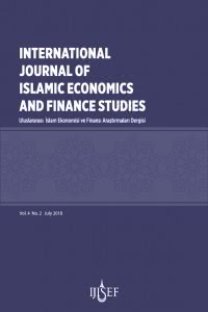An Islamıc Approach To Consumption Theory
Western originated economic theory suggests that homo economicus individuals have unlimited needs and they are insatiable. In ordinal utility theorem as human consume more they will capture higher total utility. There is no limit in consuming goods or services for rational individuals except their budgets. However, in reality if individuals consume more than optimal level they will suffer. Holy Quran and Islamic rules advises households to use only necessary amount of goods. Indıvıduals should spend for necessary amount of goods. The rest of their budget should be spent in the way of ALLAH. Indıfference curve approach can’t explain the situation in which individuals consume excess amount of goods. Zakat and institution alms are not located in western originated economic theory. In this study we use new tools to explain individuals will suffer from excess amount of consumption. Bliss point and indifference circles are used in our approach and by the help of these tools we can explain Zakat and institution alms. So this will contribute to develop Islamic economic theory.
Keywords:
Islamic Economy, Indıfference Circles, Consumption Theory,
___
- Araf (31), Kuran-ı Kerim Meali.Armağan, Servet (2005), İslam Ekonomisi, Gündoğan Yayınları.Chapra, Umer (2002), İslam ve İktisadi Kalkınma, Çeviren: Adem Esen, Cantaş Yayınları.Dilek, Serkan, Küçük, Orhan, Özdirek, Recep (2017), “Homo Economicus mu? İslami İnsan mı?”, International Congress On Political, Economic and Social Studies, 9-11 Kasım 2017 Ankara, Yıldırım Beyazıd ÜniversitesiDilek, Serkan (2016), “Tüketici Teorisine Yeni Bir Yaklaşım”, Nazariyat, 1(1), 23-30Ebusuud, Mahmut (1983), İslami İktisadın Esasları, Çeviren: Ali Özek, Hisar yayınevi.Enam (141), Kuran-ı Kerim Meali.En-Neccar, Ahmet (1978), İslam Ekonomisine Giriş, Hilal yayınlarıEskicioğlu, Osman (1999), İslam ve Ekonomi, Anadolu Dağıtım.Hatırlı, Selim (2014), Mikro İktisat, Alter Yayıncılık.İsra (26-27), Kuran-ı Kerim Meali.Kahf, Munzir (1988), “İslam Toplumunda Tüketici Davranışı Teorisine Bir Katkı”, İslam İktisadı Araştırmaları I, Tabakoğlu, Ahmet; Zerka, E.; Kehf, M; Ebu Suud, M.; Cerhi, M.; Gilani, İ.; Çapra, Ö., Dergah YayınlarıMevdudi, Ebu’l Ala (2014), İslam Ekonomisinin Temel İlkeleri, Çıra Yayınları.Orman, Sabri; Gözübenli, Beşir; Tabakoğlu, Ahmet; Zeytinoğlu, Erol; Bayındır, Abdülaziz; Erkal, Mehmet; Döndüren, Hamdi ve Şencan, Hüner (1987), Para Faiz ve İslam, İlmi NeşriyatTabakoğlu, Ahmet (2013), İslam İktisadına Giriş, Dergah Yayınları.Tabakoğlu, Ahmet (2005), Toplu Makaleler I İktisat Tarihi, Bayrak Matbaası, İstanbul.Ünsal, Erdal (2012), Mikro İktisat, İmaj Yayınevi.Zaim, Sabahattin (1992), İnsan-İslam Ekonomi, Yeni Asya Yayınları.
- ISSN: 2149-8393
- Başlangıç: 2015
- Yayıncı: Politik Ekonomik ve Sosyal Araştırmalar Merkezi
